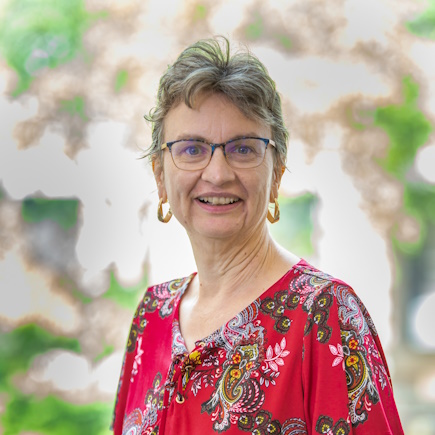Wayne State Social Work faculty impacting dementia-related health disparities for Detroit's older adults
Older adults in parts of Wayne County are dying at twice the rate of those elsewhere in Michigan due to disparities in social determinants of health. Faith Hopp, an associate professor and Hartford Geriatric Social Work Faculty Scholar at Wayne State University’s School of Social Work, is working to reduce that statistic and improve the quality of life of Detroit’s older adults. Hopp has been named a co-Investigator on a $5 million grant from the U.S. Health Resources and Services Administration to implement the Applied Gerontology Research and Education to Eliminate Disparities (AGREED) project, an interprofessional Geriatrics Workforce Enhancement Program.
The AGREED project is a collaborative effort involving six Wayne State schools and colleges, the WSU Institute of Gerontology, and eight community healthcare organizations. College of Nursing Assistant Clinical Professor Cynthera McNeill will serve as the program director and grant evaluator.
The project's goal is to educate and train healthcare and supportive care workforces to care for older adults, working closely with community partners, including the Detroit Area Agency on Aging and the Alzheimer’s Association, to address care gaps and improve health outcomes. The initiative will integrate geriatrics with primary care and other specialties to maximize patient and family engagement.

Social Work Acting Dean Debra Patterson noted “the AGREED project is one of many collaborations that the School of Social Work has enjoyed with the health science schools and colleges, bringing together interprofessional education opportunities for professionals and students. It is crucial to bridge the gap in care for Detroit's older adults. By training healthcare professionals and working with community partners from an interprofessional lens, we can improve health outcomes and address the disparities that lead to a lower quality of life.”
Projections indicate that 220,000 Michiganders will be diagnosed with Alzheimer’s dementia by 2025, with numbers expected to double by 2050. This increase will surpass the availability of trained dementia specialists.
Hopp will co-lead the Community and Alzheimer's Disease and Related Dementias (ADRD) portion of the project alongside Diane Adamo from the Eugene Applebaum College of Pharmacy and Health Sciences. Hopp will also serve as a liaison for School of Social Work students, providing them with experiential learning opportunities, aligning with Wayne State President Kimberly Andrews Espy’s Prosperity Agenda that prioritizes both accelerating mobility for our students and empowering health for our urban neighborhoods.
“One of the things I'm most excited about is the synergy that can be developed through this project,” Hopp said. “Wayne State has a long history and tradition of collaboration across departments. Within that sense of community, we work together to accomplish great things at the university and with our community partners.”
Hopp, who has dedicated more than 30 years to the field of gerontology, has a deep-rooted passion for enhancing the quality of life for older adults. Her interest in gerontology was inspired by her father Henry Pratt, a former Wayne State associate provost and professor of political science, as well as her early experiences working in a nursing home. Hopp is particularly focused on how older adults, even those with a serious illness, can maintain a meaningful quality of life and contribute to their communities.
The project addresses disparities in social determinants of health, which include factors such as health care access and quality, neighborhoods, economic stability, and social and community connections that have been found to predict up to 80 percent of a person’s health status.
“What drew me to social work was the idea that it's such an applied field that’s concerned with the dignity of the human person,” Hopp said. “As we start to focus more on a person’s social determinants of health, I think social workers are ideally situated to address those issues and make a difference in the lives of aging people.”
Richard Smith, Social Work’s associate dean for research stated, “Dr. Hopp will bring a career of research to AGREED that spans systems inpatient and community-based care to train the next generation of social workers.”
While the project is still in its preliminary stages, Hopp said they are ready to hit the ground running and welcome further collaboration from all departments on campus. Those who have questions or are interested in collaborating with the AGREED project team should contact Hopp at bb2938@wayne.edu.
Writer: Sarah Freeman and Editor: Betsy Vanderstelt